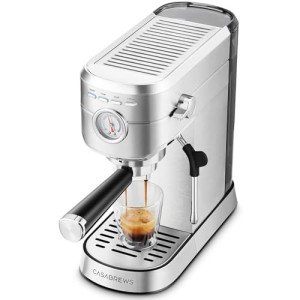Five People You Must Know In The Home Use Espresso Machines Industry
Home Use Espresso Machines: A Comprehensive Guide
Espresso machines have ended up being a staple in numerous families as coffee lovers seek to replicate café-quality brews in the convenience of their kitchen areas. The increase in popularity has caused a varied market filled with numerous designs, functions, and rates. This short article aims to offer a useful introduction of home use espresso machines, assisting readers navigate their choices successfully.
Understanding Espresso Machines
Espresso machines work by requiring warm water through finely-ground coffee under high pressure, resulting in a focused coffee beverage called espresso. There are a number of types of espresso machines categorized based on their brewing methods and level of automation. The most common types consist of:
Manual Espresso Machines: These require the user to manage the pressure and water flow, enabling a more hands-on coffee-making experience.
Semi-Automatic Espresso Machines: These use automatic control over water pressure, while the user by hand grinds and tamps the coffee.
Automatic Espresso Machines: With the push of a button, these machines instantly control the circulation of water, making it easier to brew espresso with constant outcomes.
Super-Automatic Espresso Machines: These all-in-one machines manage grinding, tampering, brewing, and even milk frothing, making them ideal for users looking for benefit.
Pill or Pod Machines: These use pre-packaged coffee pods to develop espresso with minimal effort, however they restrict option in brewing techniques and flavors.
Table: Comparison of Espresso Machine Types
Type
Control Level
Ease of Use
Cleaning Level
Suitable For
Manual
User-controlled
Moderate
High
Coffee perfectionists
Semi-Automatic
Partial automation
Moderate
Moderate
Home baristas
Automatic
Totally automated
Easy
Low
Hectic individuals
Super-Automatic
Completely automated
Really easy
Very low
Convenience seekers
Capsule/Pod
Totally automated
Really easy
Really low
Casual drinkers
Key Features to Consider
When selecting a home use espresso machine, it's necessary to think about numerous features that can significantly impact the quality of espresso and user experience.
Pressure: Look for machines that provide a minimum of 9 bars of pressure, as this is considered optimal for brewing espresso.
Boiler Systems: Single vs. dual boiler systems figure out temperature stability and the ability to brew espresso and steam milk at the same time.
Grinder: Integrated grinders allow for freshly ground coffee, which enhances flavor. Think about machines with adjustable grind settings.
Milk Frother: For those who delight in coffees and lattes, a built-in steam wand or automatic frother is important.
Size and Design: Consider your kitchen area and aesthetic preferences. Machines can be found in different sizes, from compact to big setups.
Cost: Home espresso machines can range from a few hundred to a number of thousand dollars, so it's essential to establish a budget before checking out options.
Advantages and disadvantages of Home Use Espresso Machines
Pros
Cons
Convenience of brewing coffee in the house
Preliminary investment can be high
Quality of espresso is often remarkable
Needs some ability, specifically with manual machines
Capability to explore flavors
Upkeep and cleansing can be labor-intensive
Can conserve money in the long run
Not all machines will match every coffee choice
Maintenance and Cleaning Tips
Keeping an espresso machine is important for lengthening its life and guaranteeing constant brew quality. Here are some beneficial tips:
Regular Descaling: Minerals from water can develop up in the machine. Descale every 1-3 months, depending on water firmness.
Daily Cleaning: Rinse portafilters, baskets, and steam wands after each use to avoid coffee oils from building residue.
Use Filtered Water: This can help in reducing mineral accumulation and enhance the taste of coffee.
Change Gaskets and Seals: These elements may wear with time and needs to be replaced to keep pressure and efficiency.
Check out the Manual: Each machine has particular care directions; following these will guarantee durability.
FAQs About Home Use Espresso Machines
**Q1: What is the very best budget espresso machine?The best budget espresso machine typically depends upon individual requirements, but models like the DeLonghi EC155 or the Breville Bambino are popular among users for providing excellent worth. Q2: How long do home espresso machines typically last?With White Espresso Machines , home espresso machines can last anywhere from 5 to 15 years, depending on the quality of the machine and frequency of use. Q3: Can I make cappuccinos and lattes with any espresso machine?While most espresso machines can make coffees and lattes, having a reputable
steam wand or frother is necessary for accomplishing the best milk texture.
Q4: Are super-automatic machines worth the investment?For those who prioritize benefit and quick developing, super-automatic machines can be worth the investment, though they might do not have some customizability in brew strength and flavor. Q5: What types of coffee beans are best for espresso?While individual choice contributes, beans labeled as” espresso “blends are typically roasted darker, producing abundant flavors and a velvety texture when brewed.
Buying a home espresso machine can change the everyday coffee regimen into something unique, elevating home brews to café quality. By understanding the various types of machines, key functions to think about, upkeep needs, and weighing the
pros and cons, customers can make informed decisions that suit their individual preferences. As the espresso culture continues to grow, no matter the choice, every brew can be a scrumptious experience waiting to be savored.  **
**